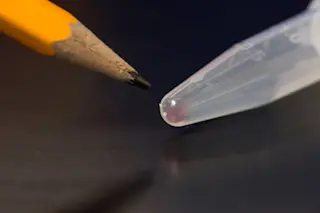The drop of pink solution in this pipette, which contains millions of DNA molecules, could store 10,000 gigabytes of data. (Credit: Tara Brown Photography/ University of Washington) Over the past few decades, it has become apparent that Moore's Law has started to come apart. The 1965 observation, named after Gordon E. Moore, stated that the number of components on a chip seemed to double every year, but we are reaching the limit of silicon's storage capabilities. To keep pushing the boundaries of computing technology, we'll need to rethink the basic components of computers themselves. And the field of DNA storage could offer a solution to a problem growing ever more apparent in our digital world: Where do we store billions of gigabytes of data that make up the Internet? "A large part of building better computers is about finding better materials to build computers with," says Luis Ceze, an associate ...
DNA Data Storage Moves Beyond Moore's Law
Discover how DNA data storage offers a solution to Moore's Law limitations, enabling immense data storage capacity.
More on Discover
Stay Curious
SubscribeTo The Magazine
Save up to 40% off the cover price when you subscribe to Discover magazine.
Subscribe













